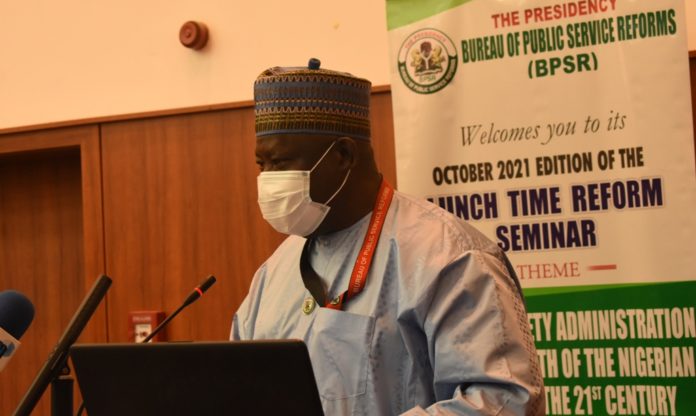Public services all across the world have always been constrained by the reform imperative of modernization, Mr. Dasuki Ibrahim Arabi, Director General, Bureau of Public Service Reforms, BPSR, said.
He revealed this when their Bureau hosted the October edition of its Lunch-time Seminar Series, in Abuja.
The reform imperative of modernization, according to him, is needed by public services to achieve an institutional vitality and readiness, capable of confronting any present or future administrative challenges.
Arabi, said the Nigerian public service post COVID-19 needs unprecedented policy response in collaboration with the private sector to lay a foundation for a stronger economy.
“It needs to develop programmes for collaboration among MDAs to deliver services and introduce change management to improve efficiency.
“It also needs to develop policies for delivering services digitally, improving the capacity of government institutions to improve response to fiscal shock and entrenching private sector engagement with the public sector,” he noted.
The BPSR helmsman, further explained that public service post COVID-19 needs to support the implementation and adoption of the Federal Government’s e-Government Master-plan that will promote infrastructural development, digitalization of government processes and documentation, create online platforms for efficiency and transparency and use the new media to provide information to the citizens.
Director-General, Nigerian Maritime Administration and Safety Agency, NIMASA, Mr. Bashir Jamoh, the seminar’s guest speaker, disclosed that though several economic activities are carried out in the nation’s maritime sector, the volume of these activities are not a true representation of optimal exploitation of the vast opportunities in the sector.
While speaking on: “Maritime Safety, Administration and the growth of the Nigerian Economy in the 21st Century,” Jamoh, who was represented by Engr. Olu Aladenusi, Director, Maritime Safety at NIMASA, said there are opportunities for improvement in port operations and the establishment of deep seaports.
He added that the volume of trade (local and international vessel calls) requires a viable ship repair and building sub-sector.
“The present capacity/performance of the ship yards in Nigeria cannot fully accommodate the demand for dry dock services leading operators to seek services elsewhere.
“Several other sub sectors of maritime business in Nigeria are in similar condition and remain unexploited.
“To address the foregoing, regulatory and operational issues must be dealt with by both the public and private sector players,” said Jamoh.
Signed:
Aliyu Umar Aliyu,
Principal Information Officer,
BPSR
28/10/2021






